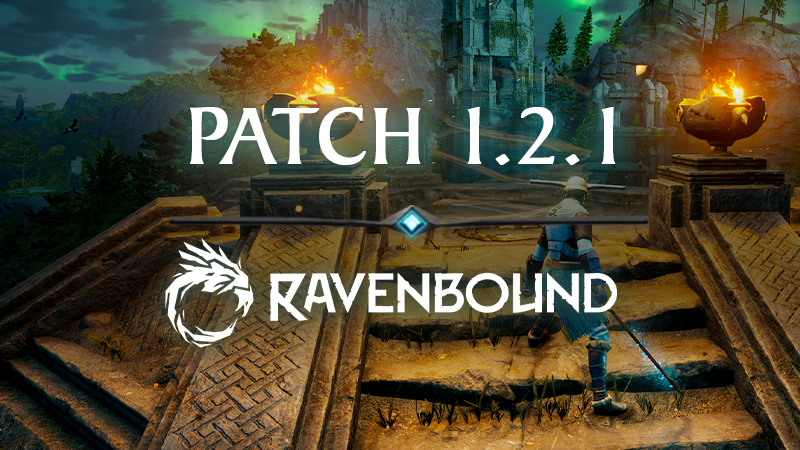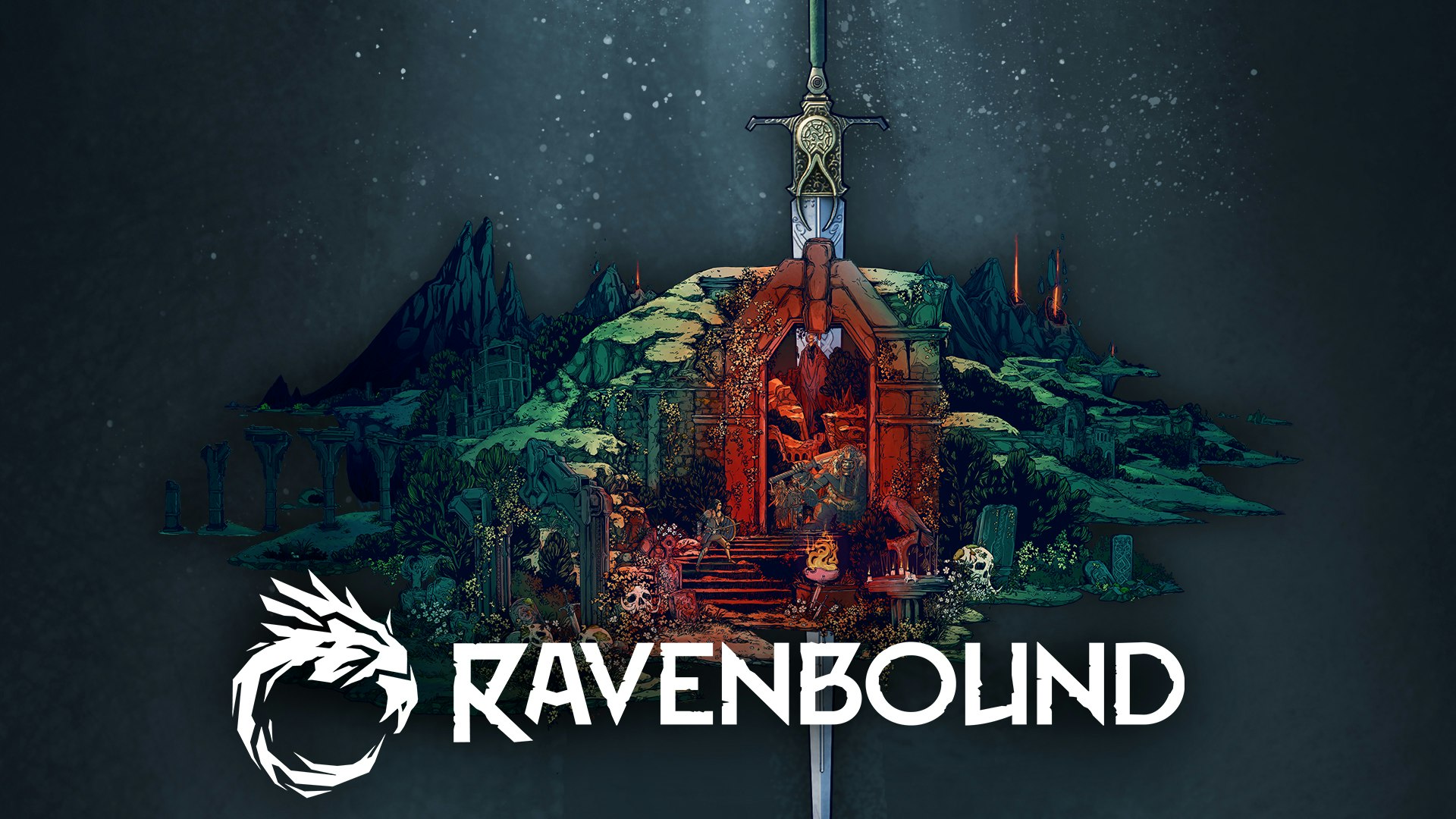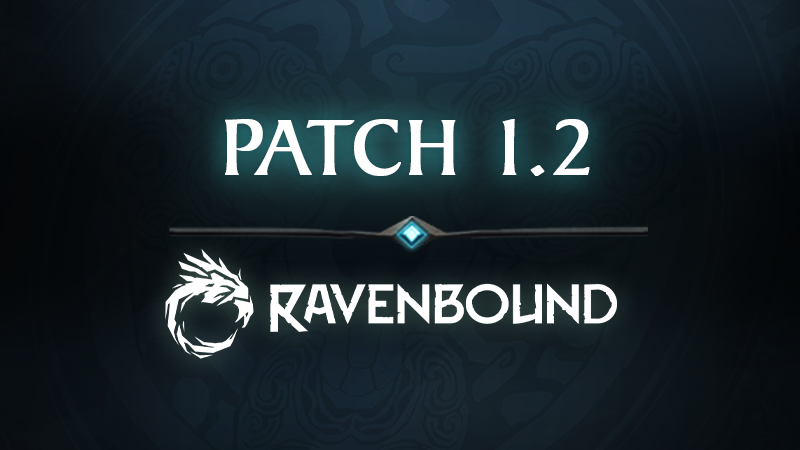Developer Q&A: Unexpected Outcomes of Patch 1.0.4 and Plans for the Future
Share this Article
In the sixth edition of the Ravenbound Q&A, we welcomed CM Althalus, Simon (Lead Designer) and Andreas (Executive Producer) to discuss future plans for Ravenbound.
Do join us on Discord if you have any questions you’d like answered or want notifications for future events!
If you'd like to listen to the full recording instead, check it out here.
Are there any plans to add a Photo Mode?
Simon: We don’t have plans for a Photo Mode, but it depends on what the community wants. If there’s a big demand for it, we would consider adding it.
It has been talked about before, and at one point we even had someone working on it, but we had to tackle more pressing matters in the game, so it’s on hold for now.
Andreas: It’s not a high enough priority for us to work on it right now. There are more important things we should focus on, like the changes brought in with patch 1.0.4, for example. These were much more important.
In a future patch, we’ll cover a lot of fun additions, but the Photo Mode is not critical to the gameplay or the overall gameplay loop. That’s why we haven’t prioritized it.
We do agree that the game looks really beautiful, so it would be really nice to add a Photo Mode. It’s nice to just be able to take screenshots. But there’s a cost to it, and the priority isn’t high enough at this moment.
Simon: Certain games have really stepped up to include their own versions of a Photo Mode, but there are different levels of this. Maybe if enough people want it but there’s still a low priority, we could do something small at first, like disabling the UI. It wouldn’t have a lot of fancy features - it could come in many forms.
Will there eventually be Warden defeat or Obliterated rewards?
Simon: Absolutely! At this time, we don’t have anything planned for a specific time or patch, but we have talked about it, and we definitely want it.
Ideally, you consider the Warden as part of your journey. Maybe you choose a specific Warden because you found an item that will work really well with the reward, so this creates a really interesting design space for us to add to and expand on.
Andreas: It fits thematically as well in the progression of the game when choosing which boss to go for next. We are looking into those mechanics already to see what fits.
How are you feeling about update 1.0.4 so far?
Andreas: I’m very happy with it from the Producer’s perspective. We’ve seen the type of feedback we’re getting from 1.0.4, which is pointing us in the right direction. It wasn’t the biggest patch we’ve ever made, but what we added - Vessel Select, for example - is an important indicator for us that we’re doing the right things. The feedback has been positive, so I’m very happy with it.
Simon: I’m super happy with it. Watching PixelRick’s speedruns and breaking record after record was very engaging to watch. Watching the videos they’ve uploaded onto YouTube has been really encouraging.
There have been several people posting really encouraging feedback about Vessel Select. We had received a lot of feedback from everyone who was really frustrated with how things were and worked on those areas to improve.
Have there been any unexpected outcomes from any of the new systems introduced - the new Cards in particular?
Simon: We found an unexpected bug with one of the Cards where if you played Destined Fortune, it broke your cycle of Cards and reset the amount of Cards you’ve played in the Vessel Screen. If you then played Inner Growth, which allows you to draw Cards equal to the number of Cards you’ve played in this visit to the Vessel Screen, you wouldn’t draw any extra Cards.
For the most part, Minor Pandemonium seems to be working correctly, but in certain situations, it could drain a Card that has the same Mana as Minor Pandemonium, meaning your Mana doesn’t change. At the moment, there’s no clear celebration to show what Card is drained, so you don’t necessarily see it, making the Card seem bugged.
We also learned with Minor Pandemonium, people didn’t expect their Folk bonus to trigger. We tried to word Minor Pandemonium to ensure it included the keyword “drain”, so then the Folk bonus adds an extra bonus when you drain a Card.
Since you have never experienced the game without the Folk bonus, it makes it feel as if your Folk bonus is giving you the ability to drain a Card and reads weirdly as a result, making you feel that when you drain a Card, you should get this effect.
We need to make it clearer or avoid Cards that do things in this way. Minor Pandemonium is fun, but that was an unexpected hurdle that taught us to be more careful in future with similar Cards.
Andreas: With the number of Cards that we now have in the game, we can have a sense of emergent gameplay just with how you can combine them and how they synergize, but we won’t figure that out until we release them!
It could be that you’re able to break the game, which wouldn’t be balanced! It’s a constant process to keep it roughly balanced while making sure there’s that emergent feeling that you’re discovering a new, cool combination of mechanics and Cards.
Simon: We had an internal playtest recently where we tested some of the upcoming Cards, and we found three different unexpected things that happened with the Cards. It’s fun because we want that unexpected synergy.
In an ideal case, we make sure that the Cards work properly with all the common synergies, but not knowing about all of them is a good place to be. We want everyone to be on the journey of figuring out all the possible combinations and synergies that the game can have.
The sort of balance that we want to go for is a challenging experience that you can master. If you become really good, then you can make anything work on the base difficulty. You’re not beholden to any luck. That’s all part of the experience, that you run into a perfect Card roll that makes you unstoppable.
This is something that we’re always tweaking, so there’s always going to be this constant back and forth in balancing the Cards. There should be instances where you don’t necessarily need to have that mechanical skill on the base difficulty, that you’re lucky and get the Cards going. That’s ongoing work, trying to strike a balance between mastery and luck, and how they interact.
How do we decide which features or bugs to prioritise for patches?
Andreas: It varies from patch to patch. With bugs, there is a severity and priority when it comes to handling them. For example, if the game is crashing, that’s a high severity and high priority, and we want to solve those kinds of issues quickly.
Bugs that would be considered low priority would be along the lines of a texture not looking as nice as it should. The game works, but it could look nicer, so it doesn’t have a high priority.
We do a “bug-triage”, where we go through bugs in the backlog and decide on which should be higher or lower priority, and which path we should take.
It’s more difficult for features. It depends on how much time it will take to complete, test and verify a feature. There are a lot of steps to create big features. In general, we would have a high-level idea of where we will improve the game.
Designers and directors decide what the best features are and what’s best for the game in the coming period. They look into how they want to improve the game while maintaining the balance, along with determining the cost; time and effort required. It’s a hard balancing act to do.
Features are tricky, but it’s very important that we start by working out what we should do first, coming from the perspective of the people who know what makes good gameplay.
Simon: It’s all connected in the sense that you might have something that’s important, but it only reaches a couple of team members. It could be something that you have to sit on for a while to properly test them, and work out how it changes the game over a longer period of time. It might be a high priority, but it’s going to take time to work on.
It’s a bit of a puzzle to work out who works on what and how it all interacts. It’s complicated to try and see all the moving pieces; something might be added into a patch that feels like less of a priority compared to something much bigger which everyone wants.
Andreas: Some of what we’ve added into the game through patches have been ideas that we wanted to try. The Hatred system, for example, was something that we added in as an idea. Then we did a new take on it, and we talked about it to see if we were happy with it.
We offer some things that are a work in progress, knowing that we might change them in a future patch because we want your feedback. We want that kind of relationship where we can learn from you.
Are there any plans to add more World Bosses, potentially ones that drop guaranteed rare Cards or other rewards?
Simon: We don’t have any plans for a wandering boss that drops guaranteed rare items right now. We’re very interested in new challenges and new bosses, and we don’t want them to be like Wardens where you’re obligated to engage with them.
It’s part of the open-world style - we want optional things with a risk/reward aspect. Is this fight worth it for me, given my current build? We have two open-world bosses now, and I think the game could work well with more of them, so you maybe engage with some, but not others. Right now, it’s not our highest priority, but we are working on more Progression features.
Are there any details on what we’re planning to add to the game to encourage exploration?
Simon: Potted Riches was one of those things that we added to test the waters a bit. We wanted to see how people would react to this sort of change. As soon as you start adding exploration rewards, you could change the game so that the optimal path of the game is to spend a lot of time looking for these things.
We want to make sure that the game doesn’t become a long checklist of looking for things. We want you to be able to play fast; it shouldn’t feel like a suboptimal way to play. In an ideal world, there’s value to both. The balance that we wanted to strike with Potted Riches was that it had a place in the meta, but is optional so you don’t feel like you have to hunt for it.
If you want to play fast and beeline to the next part, you can use the open-world aspect as having the option to choose your next encounter and adjust your build direction. That’s the foundation of the open-world aspect of Ravenbound.
We want there to be a choice when getting Cards. You can get a Card and decide that it’s not for you because you’re exploring and want to take it slow. You want to engage in that exploration.
We added Potted Riches as a test for that, to see how people react to that concept. That said, we are planning to add more things to the world, especially between camps and towers to allow you to take a Raven form. We want to strike a balance - we don’t want the optimal playstyle to be to look for rewards.
If we did, we’d be telling people to scavenge the entire world. That would work fine if this was not a roguelike where you’re going to play over and over again. We want it to be more fast-paced, you shouldn’t feel that you have to engage with the entire world.
Every run, you engage with different parts of the world to different extents, so we’re planning to add rewards that you can find, that need to be unlocked. Unlike chests that are locked by Hatred, these are unlocked by a new resource. Every run, you’d have a set amount of this resource to engage with these other rewards that you find.
You can choose to use them all early if you’re having problems with the first boss, or you can hold onto them. We want them to have meaning, so it doesn't become a checklist of jumping in and using all your resources before you start playing the game.
It should offer the option if you need a power boost early on, but if you want to optimise it, then you engage with it over time. It’s tricky to find that balance, and it’s something that we’re going to continue monitoring.
We definitely want to add to our exploration in a way where it doesn’t become optimal to play in very long runs.
Andreas: It’s almost as if we shouldn’t use the word exploration - we want to enrich the world. We want to make the world more engaging, but not so much that it’s necessary to fly around the entire world.
Are there any plans to implement a “God-mode” for those of us who want to play, but are terrible at roguelikes?
Andreas: It kind of goes against what a roguelike is. There is a possibility to make it easier, for example, and the progression we mentioned earlier is a way to approach that. If you’re not great at roguelikes, there could be a progression system that could reward you.
You have a couple of runs under your belt and level up your progression as a way to feel like you’re making progress. But right now, we have no plans to add in a God-Mode.
Simon: We are currently adjusting the difficulty - not necessarily like we did after launch where we adjusted the difficulty by nerfing enemies. In our second patch, we nerfed a lot of enemies, but it’s a little different now.
We have certain periods in a run that are a bit more difficult than we want them to be on the base difficulty mode. Now, instead of directly nerfing them, we’re adding ways for you to become more powerful.
For example, the Cards added in 1.0.4 add quite a bit of power to players. You can get a ton more Mana now than you could before. Now, when you start finding rare and legendary bounties, you’re going to be able to have a much greater time than you did before, especially with the Inner Growth Card. Being able to draw more Cards is very beneficial.
Instead of directly adjusting the difficulty of some of the later enemies and bosses, we are trying to give you more power, and that’s an ongoing change.
At some point, we’re going to want to look at our difficulty modes. At this time, we have three modes, and the base one is the most balanced. We want to spend a bit more time making sure that all of them can be as engaging as they can be.
Depending on what the community is asking, we might spend more time giving you finer settings for these difficulties, but we don’t have a God-Mode planned right now.
Thank you all so much for attending and/or reading the Q&As. Patch 1.0.4 is now live, so we’re excited to know your thoughts about the new features and tweaks we’ve made to Ravenbound. Make sure to join the Discord server if you’d like to participate in the live Q&A sessions.
Working side by side with our players, we want to create sandboxes with unique settings that allow your creativity to thrive. Our focus is freedom, exploration, and a drive to create games like the ones that kept us up at night as kids.




